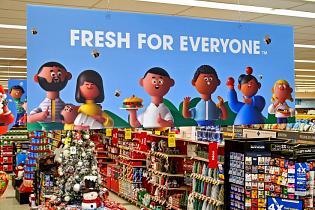Ralphs and Food 4 Less set to close in Long Beach. They blame hazard pay ordinance
As cities across the state look to require hazard pay for grocery workers, California’s grocery industry is pushing back.
Kroger, which owns several supermarket chains, said Monday it would close two stores in Long Beach in response to city rules mandating an extra $4 an hour in “hero pay” for grocery workers during the COVID-19 pandemic. The stores slated for closure are a Ralphs on Los Coyotes Diagonal and a Food 4 Less store on South Street, affecting 200 workers.
“This misguided action by the Long Beach City Council oversteps the traditional bargaining process and applies to some, but not all, grocery workers in the city,” Kroger said in a statement. “The irreparable harm that will come to employees and local citizens as a direct result of the City of Long Beach’s attempt to pick winners and losers, is deeply unfortunate. We are truly saddened that our associates and customers will ultimately be the real victims of the city council’s actions.”
The announcement comes just as the Los Angeles City Council plans to vote Tuesday on whether to pursue a similar ordinance requiring a $5 an hour boost for workers at grocery stores.
Long Beach has served as a sort of test case for hazard pay, as several cities in California, including San Jose and Oakland, consider boosts for front-line workers as well. Santa Monica’s City Council voted last month to require “hero pay” for grocery workers, and the Los Angeles County Board of Supervisors has moved forward with a similar proposal.
Kroger spokeswoman Vanessa Rosales said in an email the approval of hazard pay mandates for grocery workers in other cities could lead to more store closures. Rosales said she couldn’t share specifics about how additional pay affected profit margins at the two stores but said both were already “underperforming” even before the Long Beach ordinance went into effect Jan. 19.
The Ohio chain said it has spent $1.3 billion to reward workers and to implement safety measures throughout the pandemic.
“Kroger’s decision is unfortunate for workers, shoppers and the company,” Long Beach spokesman Kevin Lee said in a statement. Lee acknowledged that the two stores were “long-struggling” and said the city’s workforce arm would assist affected employees in accessing unemployment insurance benefits, emergency healthcare coverage, funding for retraining, skill development and job placement.
The California Grocers Assn., which represents about 6,000 grocery stores across the state, has opposed Long Beach’s efforts to boost wages, filing a lawsuit against the city in federal court last month. Last week, U.S. District Judge Dolly M. Gee denied the trade group’s request for a temporary restraining order to stop enforcement of the ordinance before a court could hear the case, and set a hearing for Feb. 19 on the association’s request for a preliminary injunction to halt the law while the case is pending.




